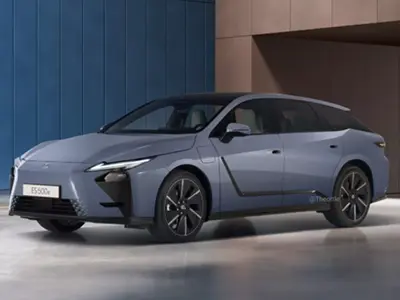
The automotive world is experiencing an era of crossover dominance, while classic station wagons have been virtually driven out of the market. However, there are many car enthusiasts who nostalgically recall the times when station wagons were not only practical, but also truly beautiful cars. In this context, the public's interest was aroused by a new design vision of the Lexus ES station wagon, proposed by independent artist Theophilus Chin. He imagined what the Lexus ES Sport Cross could be - an elegant, balanced and harmonious car capable of challenging such giants as the BMW 5 Series Touring and Mercedes E-Class Estate. Using the design signatures of the Lexus brand and complementing them with practical station wagon body shapes, the author of the render managed to create a convincing image of a model that many would like to see in serial production.
The main feature of the created visual prototype was the preservation of the general style of the Lexus ES with a noticeable transformation of the rear of the body. The roof line now stretches more smoothly and evenly, creating additional volume in the luggage compartment and making the car visually more stately. The panoramic rear window turns into a narrow strip of side windows, and wide LED optics unite both wings into a single light strip, emphasizing the modern and technological character of the model. Instead of a massive spoiler, the design includes two aerodynamic ribs, making the silhouette not only stylish, but also functional. Due to the preservation of the wheelbase and dimensions of the standard sedan, the station wagon does not visually seem heavy, but on the contrary, looks collected and dynamic, despite the increased volume of the rear.
Technical characteristics are not disclosed within the framework of the design project, but it is obvious that the hypothetical Lexus ES Sport Cross could be offered both in a hybrid version and, in the future, in a fully electric one. This would give the company an opportunity to strengthen its position in the business station wagon market, which, although shrinking, is still of interest to buyers looking for a balance between the handling of a sedan and the spaciousness of a crossover. Such models are appreciated by family people, travelers, and business clients who value comfort, prestige, and reliability. The concept would be especially popular in Europe, where station wagons have historically enjoyed steady demand and where buyers are more inclined to practicality than to the crossover trend.
Although Lexus has not officially announced the release of a station wagon version of the ES, such design experiments often serve as a kind of litmus test for identifying interest from the market. Given the growing competition from German brands and the constant need to differentiate model lines, the idea of serial production of the Lexus ES Sport Cross may not be so fantastic. Moreover, the brand itself has already shown its readiness for non-standard solutions, having released such models as the Lexus RZ or LF-ZC. It is possible that in the coming years, especially in the context of a global rethinking of mobility, we will see the return of station wagons to the premium segment, where Lexus could play a significant role. And if this happens, it is projects like the Sport Cross that will be the starting point for real change.

